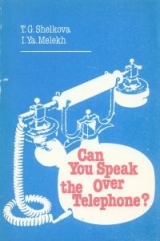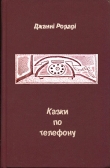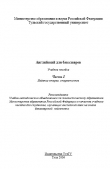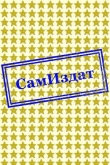
Текст книги "Как вести беседу по телефону"
Автор книги: Т. Шелкова
Соавторы: И. Мелех
Жанр:
Языкознание
сообщить о нарушении
Текущая страница: 3 (всего у книги 6 страниц)
B. INVITATIONS
1. Invitation to a Reception
Operator: Foreign Office. Good morning. Can I help you?
Mr Orlov: I’d like to speak to Mr James Marsh, please. I think it’s extension forty-seven.
Operator: Who’s calling, please?
Mr Orlov: Mr Orlov.
Operator: Will you hold the line, please?
Mr Orlov: Yes, thank you.
Operator: You are through now, Mr Orlov.
Mr Marsh: Marsh speaking.
Mr Orlov: Good morning, Mr Marsh. Orlov calling.
Mr Marsh: Good morning. How have you been?
Mr Orlov: Very well, thank you. And I hope you are well too.
Mr Marsh: Yes, I’m fine, thank you.
Mr Orlov: I’m calling to invite you and your wife to the reception to be held on the occasion of our great national holiday, the 62nd Anniversary of the Great October Revolution. It will take place on November 7, at 6 p.m.
Mr Marsh: Thank you very much. I’m delighted to accept your invitation.
Mr Orlov: Good. I’ll get the invitation card in the mail late this afternoon then. I’m looking forward to seeing you. Good-bye.
Mr Marsh: Bye-bye, Mr Orlov.
2. Extending an Invitation to Lunch
Mr Serov: This is Mr Serov speaking.
Mr Weston: Good afternoon, Mr Serov. This is Weston.
Mr Serov: Hello, Mr Weston. What a surprise! I didn’t expect you to be back in London so soon.
Mr Weston: This time I’m here only on a short visit and I’d like very much to meet you. Could you join me for lunch, say, tomorrow?
Mr Serov: Thanks for your kind invitation but I’m afraid I’m booked up for tomorrow. Could you suggest an alternative date?
Mr Weston: Just a second. I’ll look at my schedule. Can we make it Friday, then?
Mr Serov: Yes, that’d be splendid.
Mr Weston: I’ll be in touch with you and let you know the place and time.
Mr Serov: Thank you for the invitation. Good-bye.
Mr Weston: See you on Friday.
3. Invitation to a Motor Show
Secretary: Hello.
Mr Stock: Good morning. I’d like to speak to Mr Baturin.
Secretary: Who’s calling, please?
Mr Stock: This is Mr Stock from Satre Ltd.
Secretary: Will you hold the line, please? I’ll see if Mr Baturin’s available. Mr Stock, Mr Baturin is on the other phone. Will you wait or call back?
Mr Stock: I’ll wait, thank you.
Secretary: Hello, Mr Stock. I’m sorry to have kept you waiting. I’m putting Mr Baturin on the line now.
Mr Baturin: Good morning, Mr Stock.
Mr Stock: Good morning, Mr Baturin. I believe you know that the International Motor Show at Earls Court is due to open on Wednesday, October 18. We would greatly appreciate it if you could come to Earls Court to attend the official opening. The Lada 1200 Saloon from Satre Motors will make its debut at this show.
Mr Baturin: Thank you very much for your kind invitation. But unfortunately I can’t accept it. I have an appointment. I think Mr Ozerov will be able to attend this function if you don’t mind.
Mr Stock: Oh, we will be happy to see Mr Ozerov. We are sending a Complimentary Ticket[2]2
Complimentary Ticket пригласительный билет
[Закрыть] for him by hand.
Mr Baturin: I wish you every success in your business. The Lada is really creating a great deal of interest wherever it is shown. I sincerely hope that selling Soviet cars in this country will be very profitable for you.
Mr Stock: Thank you for your kind wishes. Good-bye.
Mr Baturin: Bye-bye, Mr Stock.
4. Invitation to the Ballet
Mr Hopkins: Hopkins speaking. Good afternoon.
Mr Zotov: Good afternoon. Zotov here. I’m so glad I got through at last. I tried to get you on the phone yesterday but you were out.
Mr Hopkins: Yes, I was away from London and returned this morning.
Mr Zotov: I know you are a ballet admirer. I’d like to invite you to Covent Garden. I guess you know the Bolshoi ballet is now in London and tomorrow they are performing “Spartacus”.
Mr Hopkins: Thank you very much. It’s very kind of you. I’ll gladly accept your invitation to see the fabulous Bolshoi ballet which commands the love and admiration of audiences all over the world.
Mr Zotov: Good. Incidentally the performance starts at 7.30 and runs three hours. Would you like me to call for you?
Mr Hopkins: No, thank you. Don’t bother. I’ll get there on my own.
Mr Zotov: Then I’ll be waiting for you at 7.15 outside the theatre. Goodbye.
Mr Hopkins: Thanks a lot. Good-bye.
5. Declining an Invitation
Mr Smirnov: Hello.
Mr Barlow: Hello. I’d like to speak to Mr Smirnov.
Mr Smirnov: Speaking.
Mr Barlow: Barlow here. Good morning, Mr Smirnov.
Mr Smirnov: Could you speak up, please. Your voice is ever so faint.
Mr Barlow: Hold on a minute, please. I’ll try to fix the microphone. Are you there, Mr Smirnov?
Mr Smirnov: Oh, yes. I think that’s better now.
Mr Barlow: Mr Smirnov, I’m calling to invite you to dinner tomorrow.
Mr Smirnov: Thanks a lot. It’s very kind of you and I’d be happy to join you but I’m afraid I’ve got another engagement for tomorrow. I’m very sorry.
Mr Barlow: I’m sorry too, but I do understand I should have invited you a few days ago. One can’t really expect people to accept invitations at such short notice, of course. We’ll have to make it some other time then. Good-bye.
Mr Smirnov: Good-bye, Mr Barlow.
EXERCISES
I. Read these dialogues and pay attention to telephone phrases.
II. Reproduce these dialogues as close to the text as possible.
III. Practise spelling different names over the phone.
IV. What would you say on the phone in reply to these remarks?
1. Hold on, please. I’ll see if Mr Morris is available. 2. How have you been? 3. I wonder if you and your colleagues will join us for lunch on Friday. 4. I’m calling to invite you to Covent Garden. They are performing “Othello” tomorrow. 5. Would you like me to call for you? 6. I’m afraid I will not be able to attend the Annual Meeting which you will hold on Monday. I’m so sorry, really. 7. If you’re ever in London we’d love to see you. 8. Why don’t you come round and have dinner with us next Thursday? 9. Do let’s meet sometime. 10. I wish I could, but I’ve promised to go with my children to the cinema. 11. Would you care for a game of tennis on Saturday morning? 12. Thanks awfully, but I’m afraid I’m booked up for tomorrow.
V. In what situations would you say the following?
1. Yes, I’d be delighted to accept your invitation. 2. You’ll have a chance to meet the rest of my colleagues. 3. Thanks awfully, but I’m afraid I’ve got a lunch appointment for this time. 4. Yes, that’d be splendid. I’d love to. 5. I’m terribly sorry. I’m booked up for Friday. 6. Good, see you on Sunday, then. 7. I’ve been wanting to meet you for a long time. 8. When exactly do you suggest I come? 9. It’s nice meeting you. 10. I’m so pleased to have met you. 11. I’ll get there on my own. 12. I’ll call back later. 13. Could I leave a message? 14. I understand we should have invited you a few days ago. 15. Will you speak up, please. 16. Your invitation came at very short notice. 17. Sorry. I’m engaged. 18. That suits me perfectly. 19. It is a credit card call.
VI. a) Extend an invitation by phone:
1. to a reception; 2. to the Bolshoi Theatre; 3. to an International Book Exhibition; 4. to a luncheon; 5. to your place; 6. to a cocktail party
b) Accept or decline the invitation by phone.
Read the dialogues aloud working in groups of two.
Dialogue 1
6. Entertaining Guests
Mr Block: They say that entertaining guests is an essential part of diplomatic activity. Do you share this opinion?
Mr Bulatov: I would rather consider entertaining not an essential but a most important part of diplomatic work. Apart from improving the public image of the country you represent it helps to establish contacts and make friends.
Mr Block: It takes a lot of time and efforts to say nothing of money to arrange a diplomatic reception such as an official dinner, for instance.
Mr Bulatov: Yes, it does. But the most difficult job is to make the people you have invited feel comfortable and at ease.
Mr Block: I suppose it depends on the host.
Mr Bulatov: And the hostess, the way she works out the seating plan and observes the order of precedence. Ministry officials and foreign diplomats are touchy people, you know.
Mr Block: Should the common interests and the profession of the invited guests be taken into consideration while arranging the seating plan?
Mr Bulatov: If you want your dinner to proceed smoothly you ensure it as tar as possible. The conversation among the guests will be more lively, and most probably there will be no conflicting situations.
Mr Block: Conversation is an art.
Mr Bulatov: You are right. A conversation is not an interchange of words, but ideas. Even a dinner conversation should be thoughtful, natural and still light. It is an art which is acquired by experience.
Mr Block: Some topics are in themselves unpleasant or are sure to bring out from some guests dissatisfaction or even anger.
Mr Bulatov: I don’t think that there are taboo subjects the discussion of which should be avoided.
Mr Block: Are there any topics which you wouldn’t recommend to touch upon during an official dinner?
Mr Bulatov: If there are guests whom you don’t know well enough, avoid to talk on local or national politics, religion, death and other tragedies.
Mr Block: Some people are interested in local scandals, gossip and divorces.
Mr Bulatov: Exclude them. There are some topics which interest almost everyone and are fairly sure to go well in any company. These are books, the theatre and motion pictures, radio and TV programmes, travel-places visited, scientific achievements and so on.
Mr Block: In other words the worth of the topic depends on the time, the place, and the people you are talking to.
Mr Bulatov: You are right, Mr Block.
Dialogue 2 (Telephone Conversation)
Invitation to a Reception
Operator: Foreign Office. Good afternoon. Can I help you?
Mr Klochek: I’d like to speak to Mr Drake, please.
Operator: Who’s calling, please?
Mr Klochek: Mr Klochek of the Polish Embassy.
Operator: Wait a minute, please. (Pause.) You are through now, Mr Klochek.
Mr Drake: This is Drake speaking.
Mr Klochek: Good afternoon, Mr Drake. Klochek calling.
Mr Drake: Good afternoon, Mr Klochek. How have you been all this time?
Mr Klochek: Very well, thank you. And you?
Mr Drake: Fine, thank you. Since my return from Egypt I have been eager to see you.
Mr Klochek: You will have a chance. I’m calling to invite you and your wife to the reception to be held in our Embassy on Friday, March 27, at 6 p.m.
Mr Drake: What is the occasion?
Mr Klochek: A group of actors from the National Theatre arriving for the performance in this country.
Mr Drake: You mean from the Warsaw Theatre of opera and ballet?
Mr Klochek: Exactly.
Mr Drake: Wonderful. My wife will be delighted.
Mr Klochek: I’ll get the invitation card in the mail early morning tomorrow. We are looking forward to seeing you and your wife. Good-bye.
Mr Drake: Thank you very much, Mr Klochek. Good-bye.
Dialogue 3 (Telephone Conversation)
Invitation to a Dinner
Mr Hunter: Good evening, Mr Won Diem.
Mr Won Diem: Good evening, Mr Hunter. It’s ages I heard from you.
Mr Hunter: I’ve been away for a while. It was a business trip to Thailand.
Mr Won Diem: I’m glad you phoned me.
Mr Hunter: The days have been so crowded since my return that there have been few occasions to visit any of my friends.
Mr Won Diem: I hope to see you some day.
Mr Hunter: That is what I mean. Will it be possible for you and Mrs Won Diem to have dinner with us at seven o’clock on Friday, the tenth?
Mr Won Diem: Even if we had other plans for Friday, we should try to cancel them to have the pleasure to see both of you.
Mr Hunter: So this coming Friday, at seven. We are expecting some other interesting people to come.
Mr Won Diem: Thank you, Mr Hunter.
Mr Hunter: Good-bye, Mr Won Diem.
Mr Won Diem: Good-bye, Mr Hunter. See you on Friday.
WORDS AND WORD COMBINATIONS YOU MAY NEED
1. an essential part существенная связь
to share opinions делиться мнениями
to make friends заводить друзей
to say nothing (of) не говоря уже
touchy people обидчивые люди
lively conversation оживленный разговор
an interchange of words обмен словами
gossipn сплетня
to touch upon a subject касаться предмета
divorce развод
2. to be eager сильно желать чего-л.
to hold a reception устраивать прием
to be delighted быть очень довольным
to look forward (to) ожидать с нетерпением
3. to be crowded зд. быть наполненным
few occasions редкие случаи
cancelv отменять, аннулировать
cancellationп отмена, аннулирование
EXERCISES
I. Dramatize the dialogues.
II. Make up small dialogues of your own using the active vocabulary.
III. Have a diplomatic talk with your class-mate about the ways of entertaining guests.
IV. Invite your friends over the phone to a dinner (lunch, tea party, concert, the theatre).
C. RESERVATIONS
1. Booking a Long-Distance Call
Operator: Hello.
Mr Kozlov: Good afternoon. This is Kozlov, my room number is 523. I want to make a long-distance call, please.
Operator: Where to, sir?
Mr Kozlov: To Washington, to Sovexportfilm. I wish to speak to Mr Karelin.
Operator: Do you know the number, please?
Mr Kozlov: No, I’m afraid I don’t. Can you find it out for me?
Operator: Yes, sir. I’ll get it from the directory and call you back.
Mr Kozlov: Thank you.
Operator: Mr Kozlov, your Washington number is 357-3452. Would you like me to get it for you?
Mr Kozlov: That would be most kind of you.
Operator: Do you want to make it person-to-person?
Mr Kozlov: Yes, I’d like to.
Operator: I’m sorry, the number is busy. Would you like me to keep trying?
Mr Kozlov: Yes, please. Try it again as soon as possible.
Operator: Yes, sir. I’m afraid there’s a half-hour delay on Washington.
Mr Kozlov: O.K. I’ll be in my room for a short while, but from two o’clock on I’ll be in the restaurant.
Operator: Yes, see. I’ll see that you are paged in the restaurant[3]3
I’ll see that you are paged in the restaurant. Я попрошу, чтобы вас вызвали из ресторана.
[Закрыть] if the call has not come through by two.
Mr Kozlov: Thank you.
2. A Hotel Reservation
Receptionist: Reception desk. Tavistock Hotel. Good morning.
Mr Serov: Good morning. This is Intourist. We’d like to make a reservation for Mr Kozlov.
Receptionist: Could you spell the name, please?
Mr Serov: Yes, certainly. K-o-z-l-o-v.
Receptionist: Thank you. What accommodation do you require?
Mr Serov: A single room, with private bathroom, for three nights from the 7th of October.
Receptionist: Would you hold on a moment, please, I’ll see whether we have the accommodation available.
Mr Serov: Thank you.
Receptionist: Yes, I can reserve a single room with bath, from the 7th of October, for three nights. It’s an inside room on the fifth floor.
Mr Serov: Would you please see that it’s a quiet room?
Receptionist: We will try.
Mr Serov: Thank you. What will the charge be?
Receptionist: 10.50 daily, plus 12% service charge, inclusive of breakfast. Would you please confirm this reservation in writing?
Mr Serov: Yes, I’ll write you today.
Receptionist: Thank you. Good-bye.
Mr Serov: Good-bye.
3. A Restaurant Reservation
Manager: Hello. Savoy Restaurant.
Mr Dedov: Good afternoon. This is Dedov from Techmachimport here. We would like to make arrangements with you for a small dinner party for tomorrow night.
Manager: Very good, sir. How many people do you expect?
Mr Dedov: We’ll have 20 persons.
Manager: Then I think the Rose Room would be the most appropriate. I suggest one long table, nine on each side, with one at each end. That would leave plenty of space for a little bar to be set up for your drinks.
Mr Dedov: That sounds fine. I like the idea of the little bar.
Manager: What would you like to order for dinner?
Mr Dedov: Well, I was thinking of, say, a four-course affair with wines and champagne.
Manager: Then I’d suggest hors-d’oeuvre or turtle soup, sole or omelette, beef fillet or roast duckling[4]4
hors-d’oeuvre or turtle soup, sole or omelette, beef fillet or roast duckling закуска или суп из черепахи, палтус или омлет, говяжье филе или жареная утка
[Закрыть]. And for dessert ice pudding.
Mr Dedov: Good. It suits my taste admirably.
Manager: And what about the wines?
Mr Dedov: If we are having soup, I think we’ll take a dry sherry. For the main course a red wine definitely and then finish up with champagne. That’s all. Anyway I think that would be roughly what I have in mind.
Manager: Good. What time do you wish to begin?
Mr Dedov: 7 for 7.30[5]5
7 for 7.30 с 7 до 7.30 (сбор гостей)
[Закрыть].
Manager: Thank you very much, Mr Dedov. Good-bye.
Mr Dedov: Good-bye.
4. Booking a Plane Reservation
Clerk: BEA[6]6
BEA: British European Airways Британская европейская авиатранспортная компания
[Закрыть]. Good morning.
Mr Bardin: Good morning. My name is Bardin. I’d like to book a seat on the plane to Rome for Monday, the tenth.
Clerk: Yes, sir. Do you want to travel economy class[7]7
economy class: second class
[Закрыть] or first class?
Mr Bardin: I’d like first class.
Clerk: I’ll check the time-table for you. Will you hold on, please? There is a flight leaving Heathrow[8]8
Heathrow: the biggest airport in London
[Закрыть] at 11.55 on Monday and arriving in Rome at 13.30. It flies non-stop.
Mr Bardin: That suits me. What time do I have to get to the airport?
Clerk: You’ll have to be at West London Air Terminal[9]9
West London Air Terminal: central passenger station that serves as a junction with other lines
[Закрыть] by 10.20 at the latest. The coach leaves for the airport at 10.30. But if you are going to the airport on your own you must be there before 11.30 and you can pick up your ticket at the airport booking-office.
Mr Bardin: Thank you. Good-bye.
Clerk: Good-bye.
5. Booking Theatre Seats
Clerk: Hello. National Theatre.
Mr Lazarev: Hello. I’d like to know what’s playing[10]10
what’s playingAm. что будет
[Закрыть] tonight?
Clerk: “Long Day’s Journey into Night” by O’Neill[11]11
Eugene O’Neill (1888-1953): a prominent American playwright; “Long Day’s Journey into Night” «Долгий день уходит в ночь”
[Закрыть] starring Laurence Olivier.
Mr Lazarev: I want to reserve two stalls, please.
Clerk: Sorry, sir. All stalls are sold out. Would the dress-circle do?
Mr Lazarev: Are the seats good?
Clerk: First row (Row A), seats 16 and 17, that’ll be right in the middle to the left of the central aisle.
Mr Lazarev: How far to the left?
Clerk: The second and third seats, sir.
Mr Lazarev: All right. I guess that will do. My name is Lazarev. I’ll call for them some time around seven.
Clerk: Very good, sir. We’ll keep your booking till seven then. Good-bye.
Mr Lazarev: Thank you. Bye.
EXERCISES
I. Read the dialogues and reproduce them paying attention to telephone phrases.
II. Say something in reply to the following remarks and questions.
1. Would you like to make a long-distance call, please? 2. Can you find his phone number for me? 3. Do you want to make a person-to-person call? 4. I’m afraid there will be some delay. 5. Could you spell the name, please? 6. Do I have to confirm my reservation in writing? 7. I would like to make arrangements with you for a birthday party (with the manager of a restaurant). 8. We would like to invite you for our Christmas dinner. 9. Why doesn’t this flight suit you? 10. Sorry, I can’t give you a definite answer.
III. In what situations would you say the following?
1. cannot get in touch with him. 2. The use of a large telephone directory is somewhat difficult. 3. I’m sorry you don’t have single rooms with private bathroom available. 4. I would ask you to see that the apartment is a quiet one. 5. Do you have accommodation with a less service charge? 6. We would like to make arrangements with the restaurant manager for a small dinner party. 7. A flight leaving Heathrow at 11.55 on Monday does not suit me. 8. We would prefer to have our seats in the middle of the fifth row. 9. They’ve changed the cast and we are returning the tickets to the booking office. 10. At last we have come to the airport. Thank you for the lift.
IV. Reserve by phone:
1. two rooms at the hotel for your colleagues who are coming to New York on Friday; 2. a passage on board the ship bound for Leningrad; 3. two seats on the train to Paris; you want to travel first class; 4. a table at the restaurant; arrange with the manager what you will have for dinner; you will be entertaining your friends; 5. a long-distance call to Madrid; you want to make it personal; ask the operator about the charge rates; 6. a seat on the plane to Moscow after you inquire about flights and make sure that the take-off time is convenient to you; 7. two seats at Covent Garden for a Sunday matinee.
D. INQUIRIES
1. Flight Information
Operator: Good morning. British European Airways.
Mr Sokolov: Good morning. Could you please connect me with someone who can tell me what time the afternoon plane from Moscow will be arriving?
Operator: You want Flight Information. I’ll try and put you through. I’m sorry. Flight Information is engaged at the moment. Will you hold on or call back?
Mr Sokolov: I’ll hold on, thanks.
Operator: I’m putting you through to Flight Information now.
Clerk: Flight Information. Can I help you?
Mr Sokolov: Could you please tell me if there is any delay on the flight from Moscow this afternoon?
Clerk: Yes, it’s due in at 16.35, that’s an approximate delay of twenty minutes.
Mr Sokolov: Thank you. Good morning.
2. Calling Train Inquiries
Telephone Operator: British Railways, King’s Cross.
Passenger: Train Inquiries, please.
T.I.: Inquiries.
Passenger: Can you give me the times of fast trains to Edinburgh, please, and arrival time? I’d like to get there about 6.00 p.m.
T.I.: Just a minute. Let’s see. Week days 8.48 arrive 5.10, 9.30 arrive 5.30, 10.20 arrive 6.30. Do you want any more?
Passenger: No. That’s fine, thank you very much. These are week day trains, aren’t they?
T.I.: Yes, Monday and Saturday inclusive.
3. Inquiring about Books
Secretary: Consular Department.
Mr Com: This is Corn speaking. I’m calling you to inquire about some books, please.
Secretary: Yes, what kind of books are you interested in, Mr Corn?
Mr Com: You see, I’m working on the problem of American-Soviet relations prior to World War II.
Secretary: Mr Corn, this is the Consular Department and we, as a rule, do not deal with such questions. Here, in the city we have a branch office of our book company “Mezhdunarodnaya Kniga”. You may approach them if you wish.
Mr Com: What is their phone number, please?
Secretary: It is seven-seven-four; two-five-nine-three.
Mr Com: Thank you. Good-bye.
Secretary: Good-bye.
4. Renting a House
Mr Frolov: Good morning. Is this Mr Applebee?
Mr Applebee: Yes, I’m Applebee.
Mr Frolov: I’m Frolov and I’m calling about the house you advertised to rent for the summer months.
Mr Applebee: How many are you in your family, Mr Frolov?
Mr Frolov: Four: my wife, two children and myself. Your house sounds like the sort of place we need for three months – June, July and August.
Mr Applebee: Yes, of course, we have all the conveniences and plenty of rooms to accommodate all of you.
Mr Frolov: How many closets and dressers do you have?
Mr Applebee: A lot.
Mr Frolov: My wife and I would like to see your house, Mr Applebee, but I don’t have a car right now. Can we get to you easily some other way? We are on West 86th Street.
Mr Applebee: Yes, of course. Take the 86th Street subway station, and in fifteen minutes you will be here. You have our address, don’t you?
Mr Frolov: Yes, I do.
Mr Applebee: How soon would you like to come?
Mr Frolov: Is this Saturday at three o’clock all right?
Mr Applebee: Fine. I’ll expect you.
Mr Frolov: Thank you, Mr Applebee. Good-bye.
Mr Applebee: Good-bye.
EXERCISES
I. Read the dialogues and reproduce them paying attention to telephone phrases.
II. Practise the spelling of the following names by phone:
Mr Smith, Miss McKennan, Mrs Sonnenfeld, Mr Kutuzov, Mr Surikov, Mr Schipatchev, Mrs Raskolnikov
III. What would you say in reply to these remarks and questions?
1. There will be a delay on your long-distance call to Paris. Will you wait? 2. Where can we get in touch with you, sir? 3. I’ve heard you are looking for a nice summer cottage. What sort of place do you need? 4. We have an apartment with all the conveniences. 5. Flight Information. Can I help you? 6. What kind of books are you interested in? 7. There is some delay on the flight from Moscow today. 8. Sorry, Train Inquiries is engaged now. 9. What information would you like to obtain? 10. Whom could we approach to make inquiries about your export of furs to this country?
IV. In what situations would you say the following?
1. Could you put me through to somebody who can tell me the take-off time of the plane to Milan? 2. What time does the coach leave for the airport? 3. I’ll go to the airport on my own. 4. Where can I pick up the ticket? 5. “Mezhdunarodnaya Kniga” is concerned with a wide range of records, books, stamps and other goods. 6. I would like to rent an apartment for a year. 7. Will you check my telephone line, operator? It doesn’t operate properly. 8. When is Flight 903 due to get to Washington? 9. What is the arrival time of the train from Liverpool? 10. I’m afraid your charge for the summer cottage is too high.
V. Make inquiries by phone:
1. about the take-off time of the plane to Moscow; 2. about the arrival time of the train from Paris; 3. about the goods the company is importing; 4. about the accommodation at the hotel; 5. about books dealing with modern British and American fiction, available at the shop; 6. about the trunk-call which is delayed
5. Visas
Working in groups of two, read aloud the following Telephone Dialogues.
Dialogue 1
Business Visa
Secretary: Consular Department.
Mr Ноrn: Good morning. This is Horn speaking.
Secretary: Good morning, Mr Horn. Could I help you?
Mr Horn: Five days ago I sent you my passport to obtain a visa for a business trip to the Soviet Union.
Secretary: Wait a minute, Mr Horn. I’ll make some inquiries. (After two minutes’ interval.) Yes, Mr Horn, we have your completed application form and your passport. But you did not send us three passport-size photographs.
Mr Horn: I’m afraid I didn’t. The thing is, I don’t have them.
Secretary: Then go to the local photographer and have the pictures taken.
Mr Horn: Thank you. If I send the photographs tomorrow, when can I have my passport back?
Secretary: We need at least seven clear days to issue a visa. In your case we’ll do it in three days.
Mr Horn: You are very kind, thank you. Good-bye.
Secretary: Good-bye, Mr Horn.
Dialogue 2
Tourist Visa
Miss Dodge: Good afternoon. Could I speak to somebody from the Soviet Consular Department, please?
Secretary: Good afternoon. Secretary’s speaking.
Miss Dodge: My name is Dodge. I am going to visit the Soviet Union as a tourist.
Secretary: You are welcome, Miss Dodge.
Miss Dodge: Should I apply for a visa personally or by post?
Secretary: Any way you wish.
Miss Dodge: What documents should I submit to the Consular Department, pдease?
Secretary: A completed application form, your passport, three recent passport-size photographs, and a letter from your travel agent.
Miss Dodge: Do I have to get in touch with a travel agency?
Secretary: Yes, Miss Dodge. All individual tourist trips to the Soviet Union are arranged through the “Intourist” Travel agency.
Miss Dodge: Can’t I arrange it through the Consular Department?
Secretary: I’m afraid, Miss Dodge, you cannot. It is done for your convenience. The “Intourist” will take care of the tickets and your hotel accommodation in the USSR.
Miss Dodge: Thank you very much. When you are open?
Secretary: Monday through Friday. Our Consular office is closed on Saturdays and Sundays and on all legal holidays.
Miss Dodge: Thank you again, Miss Secretary.
Secretary: You are welcome. Good-bye.
Miss Dodge: Good-bye.
Dialogue 3
An Applicant’s Passport is not Available
Mr Stock: Hello, is this the Soviet Consular Department, please?
Secretary: Yes, it is.
Mr Stock: This is Stock speaking. I would like to make some inquiries about the Soviet visa.
Secretary: Have you sent the documents to the Consular Department, Mr Stock?
Mr Stock: Not yet. The matter is, I don’t have the passport at present. It is with the Foreign Office.
Secretary: Then I connect you with our Vice-Consul, Mr Stock.
Vice-Consul (after a minute): Speaking.
Mr Stock explains his situation.
Vice-Consul: As a rule, Mr Stock, the Consulate does not issue visas without the applicant’s passport.
Mr Stock: This is an urgent business trip to Leningrad, Mr Vice-Consul, and the passport will be available from the Foreign Office within three days, I am sure.
Vice-Consul: In exceptional cases like yours we can issue a visa providing you send us all the necessary documents now, and the passport will be presented later.
Mr Stock: Thank you very much, sir. What documents do I have to supply now, except the passport?
Vice-Consul: A completed application form, three recent passport-size photographs, and a letter from your firm confirming your business trip to the USSR.
Mr Stock: I’ll deliver the documents to your Office tomorrow afternoon.
Vice-Consul: And the passport, of course, as soon as you get it from the Foreign Office.
Mr Stock: Sure thing, Mr Vice-Consul. Thank you very much.
Vice-Consul: Good-bye.
Mr Stock: Good-bye.
WORDS AND EXPRESSIONS YOU MAY NEED
1. to obtain visa получать визу
a completed application form анкета, заполненная подателем
clear days рабочие дни; непраздничные дни
2. to apply for a visa personally лично обращаться за визой
to submit a document предъявлять документ
a recent passport-size photograph последняя фотография паспортного размера
for somebody’s convenience для чьего-либо удобства
legal holidays официальные праздники
3. to explain a situation объяснять ситуацию
an urgent trip безотлагательная поездка
in exceptional cases в исключительных случаях
providingadv при условии, если
to supply documents представлять документы
confirmv подтверждать
to deliver documents доставлять документы; официально вручать документы
personifyv воплощать(ся), имитировать
EXERCISES
I. Learn the dialogues.
II. Say what documents you have to submit to the Consular Department to obtain:
– a business visa;
– a tourist visa;
– a visa when your passport is not available.
III. Make up small dialogues of your own personifying an applicant for visa and Vice-Consul.
IV. Phone the Consular Department inquiring about the delay in issuing visas for a group of Polish students.








